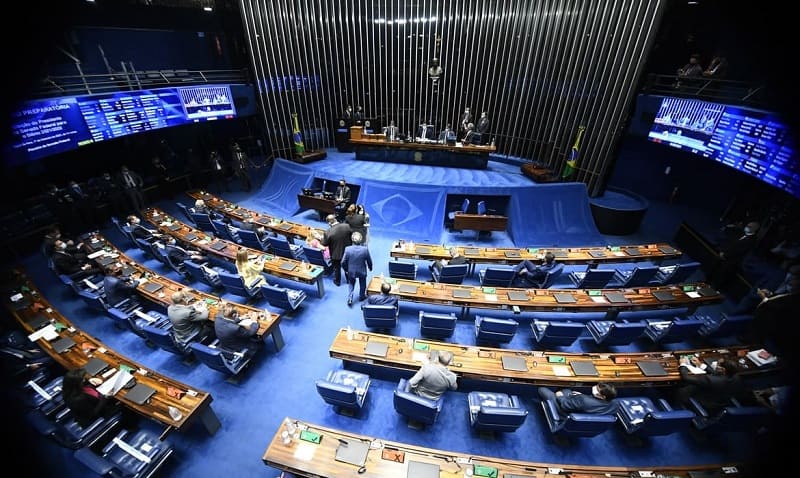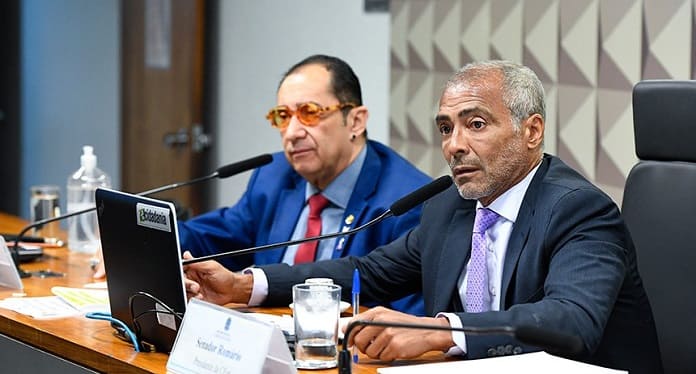The Sports Commission (CEsp) approved this Wednesday, 8th, a bill that provides for the regulation of sports betting, known as bets.
The text, from the Executive Branch, received a favorable report from the president of the collegiate, Senator Romário (PL-RJ).
PL 3,626/2023 is being processed simultaneously by the Economic Affairs Committee (CAE), which has not yet decided to vote on the proposition. The text then goes to the Plenary.
The text amends the law that deals with the free distribution of prizes for the purpose of advertising (Law 5,768, of 1971) and the one that deals with the allocation of lottery revenue and the lottery modality of fixed-odd bets (Law 13,756, of 2018).
According to the sports betting regulation proposal, the fixed-odd modality includes virtual online gaming events and real sports-themed events, such as football and volleyball games. In this modality, the bettor wins if he matches any condition of the game or the final result of the match.
According to the proposition, bets can be placed physically, through the purchase of printed tickets, or virtually, through access to electronic channels.
The authorization act must specify whether the operating agent can act in just one or both modes.
The project also deals with fantasy sport — an electronic modality in which disputes take place in a virtual environment based on the performance of real people.
According to the text, this type of bet does not constitute the exploitation of a lottery modality and is exempt from authorization from the public authorities.
Authorization
PL 3,636/2023 only requires authorization from the Ministry of Finance for the company that operates the fixed odds betting system.
The authorization is valid for five years and can be reviewed at any time, ensuring the adversarial process and full defense of the interested party. Only legal entities that meet certain requirements can be authorized, such as:
- Be constituted in accordance with Brazilian legislation, with headquarters and administration in the national territory, and comply with the regulations of the Ministry of Finance;
- Have at least one of the members of the control group with proven knowledge and experience in games, betting or lotteries;
- Have technical and cybersecurity requirements to be observed in your information systems and technology;
- Adopt internal control procedures, such as customer service and ombudsman service; It is
- Have a policy to prevent money laundering, terrorist financing, the proliferation of weapons of mass destruction, pathological gambling disorders and match-fixing and other frauds.
The administrative authorization procedure must be processed electronically. During the analysis, access to the process is restricted to the interested party and the representative.
Authorization is only issued if, after examining the documentation, the Ministry of Finance concludes that the company has the technical and financial capacity and the reputation and knowledge of controllers and administrators.
Therefore, companies must pay a consideration limited to R$30 million.
Marketing
The electronic channels and physical establishments used by the operating agent must display, in an easy-to-view location, data such as:
- number and date of publication of the authorization ordinance;
- physical address of the headquarters; It is
- customer service and ombudsman contact.
The communication and advertising actions of the betting lottery, carried out by the operating agents, must publish warnings discouraging gambling and warnings about its harm, in addition to observing restrictions on broadcast times and channels.
Advertising that presents the bet as socially attractive or that contains statements from well-known personalities that suggest that the game contributes to social or personal success is prohibited.
The dissemination of unfounded statements about the chances of winning or that suggest that the bet could constitute an alternative job, solution to financial problems or form of financial investment is also prohibited.
The text also prohibits the operating agent from acquiring rights to sporting events for any form of display of sounds and images.
Bet prescription
The bettor loses the right to receive the prize or request a refund if the payment due is not credited to the graphical account maintained by the operating agent.
In addition, it prescribes the prize not claimed by the bettor within 90 days, counting from the date of publication of the result of the event subject to the bet.
Half of the value of unclaimed prizes goes to the Student Financing Fund (Fies). The other half, for the National Fund for Public Calamities, Protection and Civil Defense (Funcap), in compliance with the financial and budgetary programming of the Executive Branch.
Integrity
PL 3,636/2023 provides for actions to mitigate match-fixing and corruption in sporting events subject to fixed-odd betting broadcast live. Bets proven to have been made through fraud are considered void.
Bettors’ resources cannot be pledged as collateral for debts assumed by the betting operating company. Furthermore, the operating agent must adopt identification procedures that allow the validity of the bettors’ identity to be verified.
The text also provides a list of those prohibited from placing bets:
- minor;
- person with significant influence or employee of the betting operating company;
- public agent with duties directly related to the regulation and supervision of the activity;
- person who has or may have access to the bet’s computerized lottery systems; It is
- anyone who has or may have influence on the outcome of the lottery event, such as athletes and other participants.
Regulation of sports betting and penalties
Any infractions must be investigated through an administrative process, with penalties imposed on the operating agents. They range from warnings to fines limited to 20% of the proceeds from the collection.
According to the text, the fine cannot be less than the advantage obtained by the offender and not more than R$2 billion per infraction.
Among the penalties imposed, the following may occur:
- partial or total suspension of activities for up to 180 days;
- revocation of authorization;
- prohibition on obtaining new authorization for up to ten years;
- prohibition from participating in bidding for a period of no less than five years; It is
- disqualification from acting as a director of a company that operates any lottery modality for up to 20 years.
In the case of other individuals or legal entities, when it is not possible to use the criterion of the proceeds of the collection in the case of fines, they can vary from R$50 thousand reais to R$2 billion.
Therefore, the Ministry of Finance may fail to initiate or suspend administrative proceedings to investigate the infraction, if the person under investigation ceases the practice under investigation and corrects the irregularities identified.

Distribution of revenue
The text approved in September in the Chamber of Deputies allocated 2% of the amount collected for social security. Other recipients of the resources would be the areas of sport (6.63%) and tourism (5%).
In sports, the amounts would be divided between the Ministry of Sports (4%), athletes (1.13%) and specific sports confederations, with percentages ranging from 0.05% to 0.4%.
Half a percent of the amount would be directed to state sports departments, which would have to distribute half to municipal sports departments, proportionally to the city’s population.
In tourism, 4% would be allocated to the Ministry of Tourism and 1% to the Brazilian Agency for International Tourism Promotion (Embratur).
Law 13,756, of 2018, which created this type of lottery, provided that companies would keep 95% of gross revenue (after prizes and income tax), while the project limits the amount to 82%.
According to the proposal, the education area would receive 1.82% of what is collected. Within this amount, 0.82% would go to preschools or primary and secondary schools that have achieved targets for national assessment results. The remainder (1%) would go to public secondary technical schools.
In the substitute presented to CEsp, the rapporteur, Senator Romário, chose to increase the transfers to the sports area from 6.63% to 6.68%. The 0.05% increase goes to the Brazilian Master Sports Committee. Tourism has reduced from 5% to 4.5%.
Furthermore, the senator directs 0.5% of the amount collected to the Ministry of Health for the development of measures to prevent, control and mitigate social harm arising from gaming.
Another 0.15% must be divided equally between the following entities: National Federation of Associations of Parents and Friends of the Exceptional (Fenapaes), National Federation of Pestalozzi Associations (Fenapestalozzi) and Brazilian Red Cross.
Amendments to the text that provides for the regulation of sports betting
The rapporteur fully or partially accepted 15 amendments presented to the text. Senators Nelsinho Trad (PSD-MS) and Soraya Thronicke (Podemos-MS) suggested that the Ministry of Finance’s authorization period for betting operating agents be extended from three to five years.
Senator Jorge Kajuru (PSB-GO) proposed that publicity and advertising actions be aimed only at an adult audience.
Romário presented two changes to the text. One of them allows the operating agent to explore up to three commercial brands on electronic channels per act of authorization. The original limit was just one trademark.
During the discussion of the matter this Wednesday, CEsp approved two other amendments highlighted by parliamentarians. Senator Izalci Lucas (PSDB-DF) suggests that lottery operators should also be authorized to sell fixed-odd bets.
Senator Eduardo Girão (Novo-CE) proposes that the broadcast of any advertising about betting be prohibited between 6am and 10:59pm.




















































